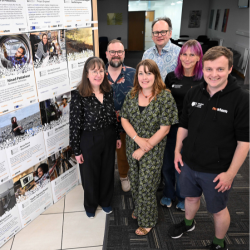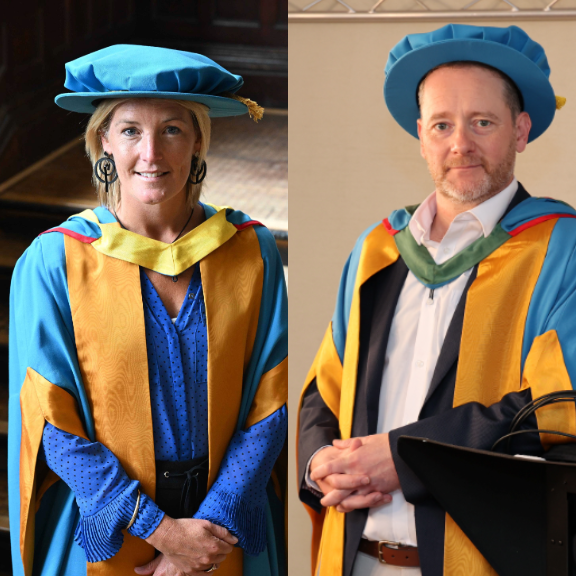-
Study
-
Clearing 2025
- Clearing FAQs
- Clearing VIP
- Clearing Case Studies
- Unlock Your Potential
- Scholarships
- Search Clearing
-
Undergraduate
- UCAS Clearing & Confirmation 2025
- Application Guides
- UCAS Exhibitions
- Foundation Years
- School & College Outreach
- Information for Parents
-
Postgraduate
- Application Guide
- Postgraduate Research Degrees
- Flexible Learning
- Change Direction
- Register your Interest
-
-
International
International
Northumbria’s global footprint touches every continent across the world, through our global partnerships across 17 institutions in 10 countries, to our 277,000 strong alumni community and 150 recruitment partners – we prepare our students for the challenges of tomorrow. Discover more about how to join Northumbria’s global family or our partnerships.
View our Global Footprint-
Quick Links
- Course Search
- Undergraduate Study
- Postgraduate Study
- Information for Parents
- London Campus
- Northumbria Pathway
- Cost of Living
- Sign up for Information
-
International Students
- Information for Students
- International Events
- Application Guide
- Entry Requirements and Education Country Agents
- Global Offices
- English Requirements
- English Language Centre
- International student support
- Cost of Living
-
International Fees and Funding
- International Undergraduate Fees
- International Undergraduate Funding
- International Masters Fees
- International Masters Funding
- International Postgraduate Research Fees
- International Postgraduate Research Funding
-
International Partners
- Agent and Representatives Network
- Global Partnerships
- Global Community
-
International Mobility
- Information for Northumbria Students
- Information for Incoming Exchange Students
-
-
Business
Business
The world is changing faster than ever before. The future is there to be won by organisations who find ways to turn today's possibilities into tomorrows competitive edge. In a connected world, collaboration can be the key to success.
More on our Business Services -
Research
Research
Northumbria is a research-rich, business-focused, professional university with a global reputation for academic quality. We conduct ground-breaking research that is responsive to the science & technology, health & well being, economic and social and arts & cultural needs for the communities
Discover more about our Research-
Quick Links
- Research Peaks of Excellence
- Academic Departments
- Research Staff
- Postgraduate Research Studentships
- Research Events
-
Research at Northumbria
- Interdisciplinary Research Themes
- Research Impact
- REF
- Partners and Collaborators
-
Support for Researchers
- Research and Innovation Services Staff
- Researcher Development and Training
- Research Ethics and Integrity
- University Library
- Vice Chancellors Fellows
-
Research Degrees
- Postgraduate Research Overview
- Doctoral Training Partnerships and Centres
- Academic Departments
-
Research Culture
- Research Culture
- Research Culture Action Plan
- Concordats and Commitments
-
-
About Us
-
About Northumbria
- Our Strategy
- Our Staff
- Place and Partnerships
- Leadership & Governance
- Academic Departments
- University Services
- History of Northumbria
- Contact us
- Online Shop
-
-
Alumni
Alumni
Northumbria University is renowned for the calibre of its business-ready graduates. Our alumni network has over 246,000 graduates based in 178 countries worldwide in a range of sectors, our alumni are making a real impact on the world.
Our Alumni - Work For Us
What will I learn on this module?
You will learn about personal finance and wealth planning with a view to understanding how different financial products can be used to satisfy different client needs and circumstances. You will learn about client appraisal; personal taxation (to include income tax, capital gains tax and inheritance tax); building an investment portfolio; mortgage finance; the handling of personal debt; insurance planning; retirement planning and estate planning in the financial planning process.
How will I learn on this module?
You will learn about personal finance and wealth planning through lectures (24 hours), seminars (12 hours), and directed and independent learning (164 hours). Through the lectures, you will gain an understanding of the basic knowledge input and subject material required to enable you to meet the module learning outcomes. The seminars are an opportunity for you to further develop understanding and knowledge by reinforcing the subject material and exploring relevant issues by preparing materials and case studies in advance of the session. In the seminar sessions, you are expected to work as an individual or as part of a group in which presentations and discussions will also be used to develop your skills of discussion, analysis and reflection.
Further, you will be undertaking both directed and independent learning. Directed learning may include a range of activities including pre-reading, preparation for seminar activity, and preparing for presentations. You will also be expected to undertake directed learning activities that will help you build the necessary resources to write the final assignment and prepare for a presentation to be given in week 12 of the module. Independent learning is learning in which you identify and pursue areas of interest or broader knowledge in personal finance and wealth planning, through a range of learning activities that will include reading, reflection and research.
How will I be supported academically on this module?
You will be supported by during small group seminars and tutorials via your tutors providing face-to-face feedback. In addition tutors will respond to your questions via the module’s discussion board at the University’s e-learning portal so that the whole group can benefit. All learning and teaching materials will be available through the e-learning module site. You will be invited to attend guest lectures from industry experts which will be provided to bring theory into practice. Further to this you will have extra support via lecture capture and us of an online reading list.
What will I be expected to read on this module?
All modules at Northumbria include a range of reading materials that students are expected to engage with. Online reading lists (provided after enrolment) give you access to your reading material for your modules. The Library works in partnership with your module tutors to ensure you have access to the material that you need.
What will I be expected to achieve?
Knowledge & Understanding:
• You will gain knowledge of how different personal financial products and be able to apply them to satisfy differing clients’ needs and circumstances (MLO1).
• Identify and assess different personal financial needs, products and their impact of personal taxation (MLO2).
Intellectual / Professional skills & abilities:
• Able to make reasoned recommendations as to the actions required and suitable products to meet the client needs (MLO3).
Personal Values Attributes (Global / Cultural awareness, Ethics, Curiosity) (PVA):
• You will demonstrate an understanding of the current market situation while making reasoned and ethically sound recommendations (MLO4).
How will I be assessed?
You will be assessed by a combination of formative and summative assessment strategies.
Formative assessment will take place through group work, case study activity, assignment discussion and theory/practice related discussions. Directed learning activities will build resources use in the final assignment case study.
The summative assessment will assess the module learning outcomes through an individual presentation (40%) in week 12 (MLO3 and MLO4), and an individual 2500 words report (60%) on a client based scenario (MLO1 and MLO2).
Pre-requisite(s)
None
Co-requisite(s)
None
Module abstract
‘Personal Finance and Wealth Planning’ will not only help you pass another module for your degree, this module will help you build relevant financial skills for life. You will learn about areas of finance that you may need to engage with as you progress through your life. You will learn about the lifetime financial planning process, how to save and build an effective investment portfolio, the impact of personal taxation, how to obtain a mortgage, how to manage debt, how to plan for retirement and even how to manage your estate. You will also learn how to address these issues through the eyes of a professional financial advisor, and the module builds to an assessment where you will prepare a financial plan for a client, based on a comprehensive case study and present this to them in the final week of the module.
Course info
Credits 20
Level of Study Undergraduate
Mode of Study 4 years Full Time
Location Qatar
City Qatar
Start September
All information is accurate at the time of sharing.
Full time Courses are primarily delivered via on-campus face to face learning but could include elements of online learning. Most courses run as planned and as promoted on our website and via our marketing materials, but if there are any substantial changes (as determined by the Competition and Markets Authority) to a course or there is the potential that course may be withdrawn, we will notify all affected applicants as soon as possible with advice and guidance regarding their options. It is also important to be aware that optional modules listed on course pages may be subject to change depending on uptake numbers each year.
Contact time is subject to increase or decrease in line with possible restrictions imposed by the government or the University in the interest of maintaining the health and safety and wellbeing of students, staff, and visitors if this is deemed necessary in future.
Useful Links
Find out about our distinctive approach at
www.northumbria.ac.uk/exp
Admissions Terms and Conditions
northumbria.ac.uk/terms
Fees and Funding
northumbria.ac.uk/fees
Admissions Policy
northumbria.ac.uk/adpolicy
Admissions Complaints Policy
northumbria.ac.uk/complaints










